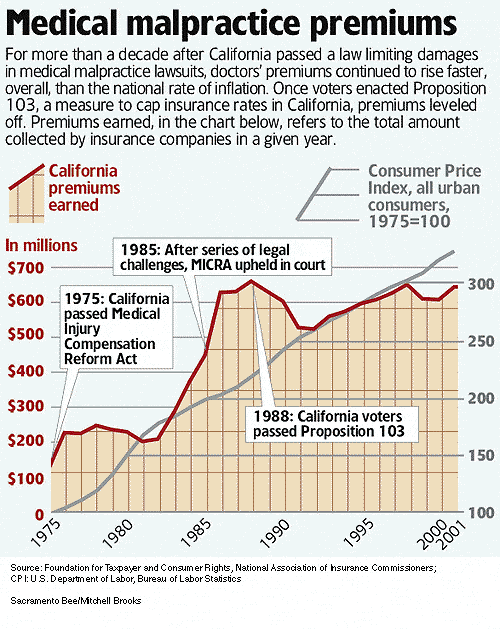 Many in state fear HMO reform efforts will suffer.
Many in state fear HMO reform efforts will suffer.
As doctors nationwide press Congress to copy a California law that limits damages in malpractice lawsuits, many in California — including the governor and the state medical society — fear the federal legislation may undermine state HMO reform efforts.
The House Commerce Committee will vote Wednesday on a bill that would, like the 1975 California law, cap payments for pain and suffering in medical malpractice lawsuits to $250,000. The effect, physicians hope, will be a dramatic drop in malpractice insurance premiums.
Washington's efforts to borrow a page from Sacramento, however, may stamp out a cornerstone of patients' rights here: the ability to sue HMOs for unlimited damages.
"The current debate in Washington about malpractice caps misses many steps we have taken to protect California patients," said Daniel Zingale, Cabinet secretary for Gov. Gray Davis.
To be sure, malpractice premiums in California are lower than the rest of the country. By some insurance company estimates, California doctors' average annual premiums, about $14,000, are a third of the $39,050 average in West Virginia and half the typical cost of coverage in Pennsylvania, two states that have recently seen physicians walk off the job to protest premiums.
Within California, however, the cause of low premiums remains open to debate. Doctors here credit the 1975 state law with keeping rates in check, while lawyers and consumer groups maintain a 1988 ballot initiative curbing insurance costs did the trick.
Resurrecting an age-old tussle between states' rights and federal power, the malpractice changes proposed in the House could override insurance law in California. A federal law known as ERISA governs employee benefits, but insurance regulation generally falls to the states.
ERISA was conceived to make it easier for nationwide corporations to offer uniform pension benefits to workers in different states at a time when few workers got health insurance on the job. As health care became a standard perk for American workers, the line between benefits and insurance regulation has blurred, setting the stage for the current debate over patients' rights to sue over negligent medical care.
The House malpractice bill, HR 5, with its broad definition of health care lawsuits, limits payouts to patients in cases involving not only doctors, but also HMOs, drug companies, medical equipment makers and others. It would leave intact state laws setting damage caps in physician malpractice suits, but it would not allow states to set payments higher than $250,000 in suits against HMOs, California officials said. California patients have the right to sue HMOs for unlimited damages in state court.
Doctors in California want to see the state's malpractice liability law copied exactly by Congress, rather than modified to give legal protection to HMOs, said Steve Thompson, lobbyist for the California Medical Association.
"The California law we supported was intended to protect doctors and hospitals — people who deliver care," Thompson said, "but the health plans would benefit from the way the House bill is laid out."
Moreover, consumer groups in California fear the federal malpractice changes might undercut future efforts to expand patients' rights in California.
For years, trial lawyers and patient advocates have wanted a new state law that would require juries to be told about the damcaps on damages for pain and suffering in physician lawsuits, which attorneys are not allowed to mention under the state's malpractice regulations.
In addition, consumer groups have considered pushing legislation or a ballot initiative to raise the $250,000 cap on damages in malpractice suits, which has remained unchanged since 1975.
Both could be out of the question if the House bill becomes law because it spells out federal authority over malpractice suits and broadly defines health care lawsuits to include HMOs, said Jamie Court, executive director of the Foundation for Consumer and Taxpayer Rights.
"The point of creating state HMO liability law was to hold HMOs accountable for interfering with doctor-recommended care," Court said. "The House bill won't do anything to reduce malpractice insurance premiums for doctors. All it will do is make it impossible for patients to sue HMOs."
————————————————————————
The Bee's Lisa Rapaport can be reached at (916) 321-1005 or [email protected]









